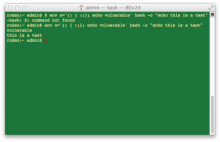Bugzilla Zero-Day Exposes Zero-Day Bugs
A previously unknown security flaw in Bugzilla — a popular online bug-tracking tool used by Mozilla and many of the open source Linux distributions — allows anyone to view detailed reports about unfixed vulnerabilities in a broad swath of software. Bugzilla is expected today to issue a fix for this very serious weakness, which potentially exposes a veritable gold mine of vulnerabilities that would be highly prized by cyber criminals and nation-state actors.












































































